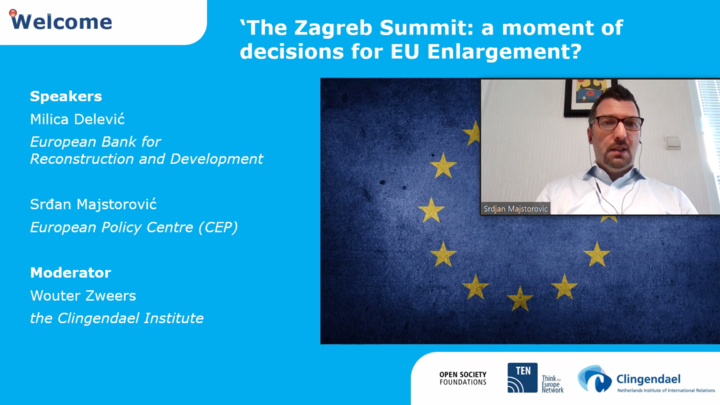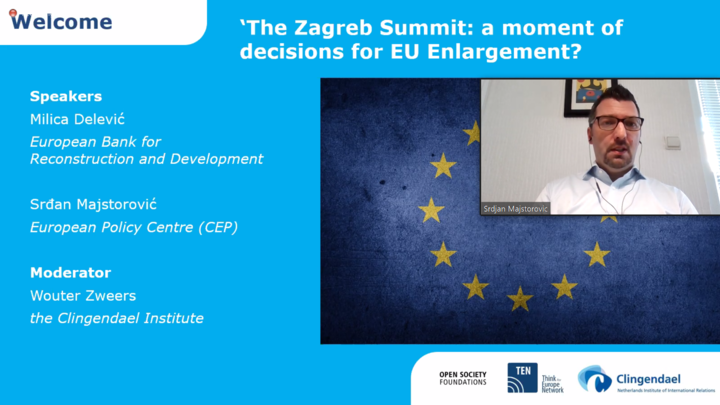Looking ahead at the future of EU enlargement

23 April 2020 – “The Zagreb Summit: a moment of decisions for the EU enlargement?” event was organised today in collaboration with the Think for Europe Network (TEN) and the Clingendael Institute. The aim of the event was to provide a better understanding of the current state of the EU enlargement policy and to facilitate the exchange of views between leading experts and the public from the Western Balkans and the Netherlands.
The first part was a closed event, held according to Chatham House rules and featuring Dutch parliamentarians and experts from the region and the EU to share their perspectives on current developments in EU enlargement. In the second part of the event, which was open to the public, Srđan Majstorovic, Chairman of the Governing Board at the European Policy Centre – CEP, Milica Delević, Director of Governance and Political Affairs at the European Bank for Reconstruction and Development, and Wouter Zweers, Research Fellow at the Clingendael Institute, discussed the effects of the COVID-19 Crisis on EU – Western Balkans relations, the prospects for the Zagreb Summit, the revised enlargement methodology as proposed by the European Commission, and the outcomes of the March European Council.
Regarding the new enlargement methodology, Majstorović highlighted that his advice to enlargement countries is to adhere to the new methodology and to focus on the issues that can be delivered within clusters that are defined with this methodology. “The new methodology is a positive sign, but there are no guarantees. What is most important for EU enlargement is the readiness of candidates, more credibility from the side of the EU, and the broader context in which the EU will find itself”, Majstorović said.
Delević also pointed out that “we should not blame the old methodology for everything”, even though “the new methodology does have positive points and less time lag”.
The EU – Western Balkans Summit (Zagreb Summit), originally scheduled to take place in Zagreb on 7 May, has been postponed until June. A new date will be sought in June in agreement with the President of the European Council, or a video conference will be organised at some point by the end of the Croatian Presidency.
“Croatia has managed to keep the enlargement process on the agenda of the Council – we need to take a moment to acknowledge the successes of their presidency in these difficult times”, Majstorović pointed out.
Majstorovic emphasized that having good political leadership is extremely important for the European integration process. “Political leadership is an important component of the integration process, required to avoid the politicisation of enlargement both on the sides of candidates and the EU, respectively. Integration needs to be based on democratic principles and dialogue within democratic institutions. One of the governments showing such effective political steering is the current North Macedonian government. I would like to see more governments showing such a positive political direction”, Majstorović said. He also stressed that the EU should play a bigger role in the coordination of public health policies. “Pandemics do not recognise national borders and we will need to work together – the EU must therefore take the Western Balkans countries into consideration!”
Majstorović also mentioned that the COVID pandemic brings with it the necessity for closer cooperation in the Western Balkans, requiring sharing public health, and other, capacities. This cooperation needs to be enhanced,” he underlined.
The event is organised within the Europeanisation Beyond Process project, with support of the Open Society Initiative for Europe.
The webinar video can be viewed here.

